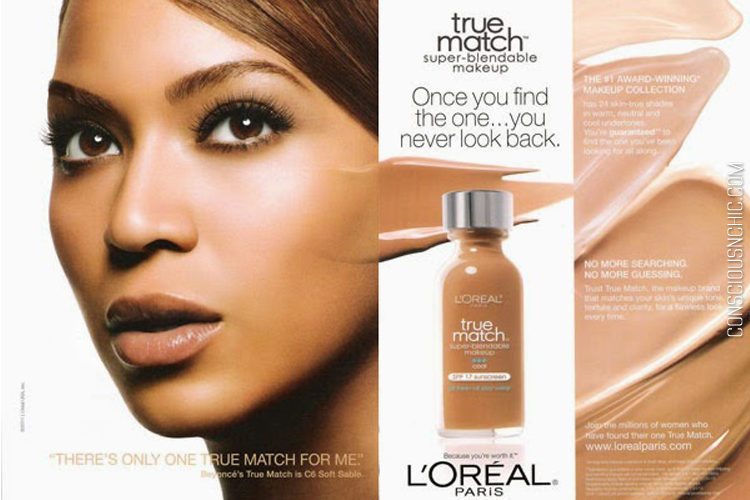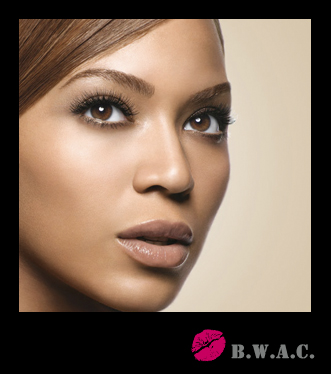We here at B.W.A.C love that L’Oreal Paris is embracing the multi ethnic backgrounds of all women, especially women of color. Once upon a time, really a decade ago, it was impossible to find a foundation color past a certain skin tone among most of the major makeup brands. With the noticeable increase of minority populations in America came a more inclusive marketing strategy for many major brands; thus extending the variation of hues available in their once limited color palettes. With this came the inclusion of more minority spokeswomen i.e. Beyonce, Halle Berry, Queen Latifah, and JLo to name a few. But, like everything else in this world, the focus has now shifted and there has been a recent uproar over the L’Oreal Paris True Match ad that features a now “multi-ethnic” Beyonce as opposed to the black Beyonce that we once knew. No it is not about them lightening her skin color, that is another issue. We will let you read it for yourself and tell us what you think…
The latest controversy in Beyonce Knowles news may be her breast-feeding Blue Ivy in public, but I’m still shaking my head about the recent fuss over her True Match commercial for L’Oreal, which highlights the singer’s mixed-race heritage. In the ad the star says, “There’s a story behind my skin. It’s a mosaic of all the faces before it.” Apparently this is controversial to some, who suggest that the singer is trying to distance herself from African-Americans. Come again?
 News flash: As revealed by Harvard professor Henry Louis Gates Jr. (who is also The Root‘s editor-in-chief), the majority of blacks in this country are of mixed-race heritage, as are many throughout the Diaspora. I find it interesting when critics try to erase history in an attempt to promote the idea that we’re 100 percent black. The truth is that the history of African-Americans is a history of mixed-race ancestry — some of it by choice, and much of it by force. Many blacks in America and throughout the Diaspora are no more 100 percent black than those who identify as white people are 100 percent white. Just because you say it doesn’t make it so.
News flash: As revealed by Harvard professor Henry Louis Gates Jr. (who is also The Root‘s editor-in-chief), the majority of blacks in this country are of mixed-race heritage, as are many throughout the Diaspora. I find it interesting when critics try to erase history in an attempt to promote the idea that we’re 100 percent black. The truth is that the history of African-Americans is a history of mixed-race ancestry — some of it by choice, and much of it by force. Many blacks in America and throughout the Diaspora are no more 100 percent black than those who identify as white people are 100 percent white. Just because you say it doesn’t make it so.
Mixed-race blacks have existed long before we were allowed to check more than one racial category on U.S. census forms, so this outrage over the singer’s identification of her racial heritage because it’s some form of self-loathing is misplaced.
Many blacks (and whites, I might add), particularly with roots in Louisiana, are of Creole ancestry. The term “Creole” is used in other parts of the Diaspora (Haiti, St. Lucia, Trinidad, Suriname, Mauritius, Nigeria, Gambia, Trinidad, Sierra Leone) to describe mixed heritages, and news flash again: Not all Creoles are light-skinned, which brings me back to my original point.
Identifying your full racial composition does not make you any less black than someone who identifies only as black. In my mind, at least, if you know African-American history, then you know that mixed-race heritage is a part of it.
As for the ad, it’s about time mainstream cosmetics companies started paying attention to the racial composition of women of color. Maybelline launched a cosmetics line for women of color in the early 1990s, when its ad campaigns literally portrayed black women as color palettes. Shortly thereafter, Revlon enlisted actress Halle Berry as a spokesmodel for its cosmetics line for women of color. I’m glad that cosmetics companies and advertising agencies are finally publicly acknowledging that they understand the complexity of black skin.
Perhaps folks are still reeling from L’Oreal’s 2008 print campaign, in which Beyonce’s skin was significantly lightened. Maybe it is memories of the 2011 L’Officiel Paris cover and spread, in which the singer’s skin was painted dark with the theme of “African Queen,” which was far more problematic than this recent dustup could ever be. Or it could be a photo for Beyonce’s album 4 — in which she appears to have been photoshopped to have pale skin — that has folks riled up. But questioning her blackness is going too far.
The woman is married to Jay-Z, her parents refer to themselves as black, and she refers to herself as black or African-American even when discussing her Creole heritage. Just because you’re light-skinned doesn’t automatically mean that you think you’re better than darker-skinned blacks, don’t want to be black or are dying to be white.
Clearly Beyonce is trying to reach an international audience, and it’s working. Why might she want to attract a growing audience? Maybe it’s because her core audience of African-Americans appears to be turning on her with a constant flow of criticism about pretty much everything, including her skin color. The hoopla and hateful comments about what Beyonce’s baby with Jay-Z would look like before Blue Ivy’s birth speak more about black folks’ self-loathing than any L’Oreal ad ever could.
The obsession with all things Beyonce, including her skin color, must stop. She is of mixed-race heritage and should be allowed to invoke it, even in a cosmetics ad.
If Bey isn’t black enough for you, then that’s your problem — not hers.
Nsenga K. Burton, Ph.D., is editor-at-large for The Root



